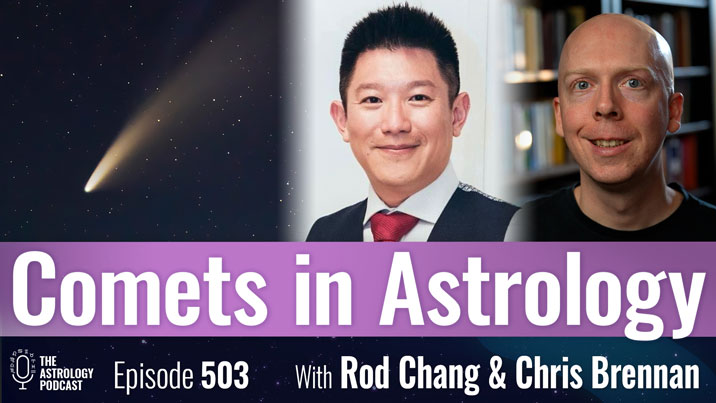In episode 503 of The Astrology Podcast astrologer Rod Chang joins me to discuss the long and fascinating history of comets in astrology, how astrologers viewed them as omens in ancient times, and creating a new foundation for interpreting them today.
While comets are a notable astronomical phenomenon and are famous in legends from ancient times as powerful omens, there has been very little discussion about their meaning or use in modern astrology. Part of the reason for this is that they appear so infrequently, are difficult to calculate, and are not included in most astrology software, which has led to them being largely overlooked by contemporary astrologers.
We begin the discussion by exploring the long history of comets in astrology, noting the contrast between the Western tradition and the Chinese tradition. In the West, research into comets was set back for centuries by Aristotle’s mistaken belief that they were merely atmospheric phenomena. In the Chinese tradition, however, comets were meticulously documented for thousands of years, where they were often referred to as “broom stars” that could sweep away the old government or indicate the need for reform. This eventually led to a rich history of astrological interpretation, which we are only now beginning to recover and understand.
During the course of the episode we talk about what comets are from an astronomical perspective, as well as how their erratic and unpredictable nature became a key part of their astrological interpretation. Traditionally comets were interpreted as omens that signified major disruptions, the death of prominent people, and important turning points in history. Their meaning was often derived from their visual appearance, such as their color or the shape of their tail. While often viewed as negative omens that coincided with natural disasters or the death of rulers, there are also instances where they were interpreted positively.
Towards the end of the episode we discuss how contemporary astrologers are now in a much better position to study comets, with new tools that allow us to calculate their positions and go back and research what was happening in the world when major comets appeared in the past. This is a large part of the focus of Rod’s new book titled Comets in Astrology, where he identifies some of the most important “Great Comets” in history and documents the events that coincided with their appearance. We hope that this discussion provides a good foundation for a subject that will become an exciting new area of research in astrology in the years to come.
Rod’s book was just released August 13, and you can get it now:
You can find out more information about Rod on his website:
This episode is available in both audio and video versions below.
Timestamps
00:00:00 Introduction
00:01:05 Rod’s journey into studying comets
00:02:40 Why comets are overlooked in modern astrology
00:07:09 What is a comet?
00:10:04 Short-period vs. long-period comets
00:16:55 Erratic and unpredictable quality of comets
00:19:18 Aristotle’s error vs. Chinese documentation
00:24:30 Edmond Halley, Brahe, and Kepler
00:28:58 Recent comets: Pons-Brooks
00:33:52 Decline of astrology hindered comet research
00:36:39 Researching historical comets and mundane events
00:39:01 What defines a “Great Comet”
00:51:04 Chinese “broom stars” and political significance
01:01:06 Comets as omens
01:11:47 Death of prominent people
01:15:02 Mark Twain and Halley’s Comet
01:25:52 Observational astronomy
01:36:18 Comet’s tail and directionality
01:40:03 Positive interpretations of comets
01:43:27 Setting a foundation for comet research
01:48:11 Rod’s upcoming work, website, and classes
01:51:29 Concluding remarks
Watch the Video Version of This Episode
–
Transcript
A full transcript of this episode is available: Episode 503 transcript
Listen to the Audio Version of This Episode
Listen to the audio version of this episode or download it as an MP3:
Podcast: Play in new window | Download (Duration: 1:54:07 — 105.1MB)
